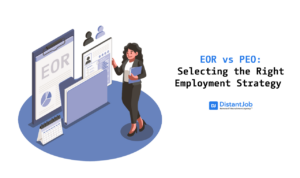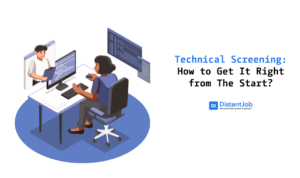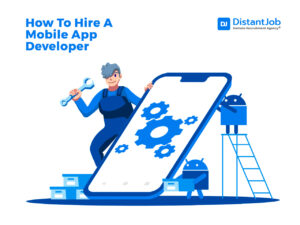With the development of the IT sector, the role of DevOps engineers was born! DevOps bridge the gap between development and operations. In recent years, most businesses prefer to hire a DevOps engineer because this decision could mean seamless project development and management. It is best to hire one for your business if you have a software project in the pipeline but you also must know how to look for the right fit for your organization. To hire top talent, you must be ready with some of the best DevOps practical interview questions to ask.
Before we get to those top interview questions, let’s understand what a DevOps engineer does and why one could be a good decision.
What is a DevOps Engineer?
“DevOps” comes from merging development and operations.
A DevOps engineer collaborates with software developers, operation teams, and other IT teams within a business to manage and oversee code deployments and launches.
This role requires someone with a combination of tech skills and soft skills. This kind of a combination will help the DevOps engineer to not only have smooth internal communication but also external communications with your clients and stakeholders as well.
Why You Must Hire a Remote DevOps Engineer
A few years ago, development engineers and operations engineers were separate roles that had different responsibilities. Development engineers were responsible for coding and testing, while operations engineers were focused on the infrastructure configuration tasks and delivery. Operations engineers had little to no knowledge of software development.
This gap between the two departments of development and operations was filled by the appearance of DevOps engineers.
Some of the main benefits of hiring a DevOps engineer for you business are:
- Your project will see seamless execution and timely delivery.
- During a project, DevOps engineers provide support to ensure that the infrastructure is up-to-date and has protection against security breaches. This means that you will see high quality output in your project.
- You can expect faster resolution to problems and simplified management of processes and workflow.
Why opt for a “remote” DevOps engineer?
- The new normal is all about working remotely. Most businesses are now working on a fully remote model or a hybrid work model.
- If you’re a business that is moving with the times and evolving, hiring a remote DevOps makes sense.
- DevOps is all about coordination and collaboration that enables developers, QA teams and operations to work together as a team. A remote DevOps engineer has become even more important as remote work requires bridges to combat communication gaps that may arise.
So, if you want to ensure that your dev and ops teams are working together in today’s digital-first era, then all you require is to look for remote DevOps professionals with the right set of skills who can help you to deliver innovation in an agile and trusted manner. However, in the current environment, your company’s first priority must be to continually monitor your product quality and shift towards automated testing at a very early stage in DevOps.
DevOps Practical Interview Questions to Ask in 2021
It is important to ask the right questions in order to hire a DevOps engineer that fits your business and project perfectly. Let’s dive into the top 5 questions that you can ask the candidates during your remote interview process.
1. Why Do You Think That DevOps is a Necessity?
Good candidates will most likely start talking about current IT trends, followed by the answer.
Look for a detailed answer where the candidate is able to establish the importance of their role with conviction. Such an answer should revolve around the following facts about a DevOps engineer’s role and current industry trends.
Recently, businesses have started experimenting with the provision of small features through multiple launches and releases instead of deploying big features.
For this reason, companies need faster delivery of software products while ensuring that the failure rate is low. If there are any crashes or bugs in the new release, the recovery and fixes should be quick.
The approach to release smaller features in batches is preferred by the businesses in 2021 because this allows for prompt customer feedback. This leads to quick fixes wherever needed in order to provide the highest level of customer satisfaction.
Without seamless synergy between the development and operations teams, this is not a possibility. A DevOps engineer is able to handle this easily while ensuring hassle-free software delivery.
Most companies that have adopted DevOps have attained very high performance levels that were not possible a few years ago. They’re able to deploy hundreds of codes devery day with higher efficiency and security.
2. What is the Difference between Agile and DevOps?
The candidate you’re interviewing could explain this in different ways. However, below are the main points to look out for.
- Agile is a set of principles and values on production methods. For example, if someone comes up with a great idea and wants to go from concept to building practical software, Agile principles and values can be used to achieve the outcome. In this case, the concept software that has been built might only function on the developer’s devices or in a test setting.
- DevOps techniques and tools will be needed to move this concept software quickly and easily into production infrastructure.
To conclude, Agile software development is only software development. On the other hand, DevOps is responsible for managing the development and deployment of the software by using the safest and the most reliable methods.
3. What are the Top DevOps Tools According to You?
Below are some of the most common DevOps tools. Candidates might mention other tools but these are some of the most popular ones that a good candidate should be aware of.
- Git – for version control system
- Jenkins – for continuous integration
- Selenium – for continuous testing
- Nagios – for continuous monitoring
- Docker – for containerization
- Puppet, Ansible, Chef – for configuration management and deployment
Further to this, you can ask the candidate about their experience working with these tools and why they feel that these are good to work with.The candidate should be able to describe a past project in relation to these tools. This will help you understand how they manage a project.
4. Describe Your Cloud Expertise
A good DevOps engineer will certainly be familiar with Cloud and cloud-based tech.
There is an increasing demand for cloud, and this has created an increasing demand for DevOps engineers who have experience working on cloud-based technologies. Some of these technologies are Amazon Web Server (AWS) and RackSpace, Google Elastic Cloud, Microsoft Azure, and OpenStack.
Don’t just be impressed by the number of cloud technologies that the candidate mentions. It is recommended that you ask the candidate a few questions about their experience working with these technologies and which cloud-based project they managed previously. This will give you an idea about their practical knowledge of the same.
Besides AWS, ask the candidate about their experience with EC, S3, Redshift, Glacier, and Route53, etc. as AWS was the only one that was used previously but now DevOps engineers have many options in cloud-based tech. This will tell you how up-to-date the candidate is.
A good candidate will be happy to describe their experience in detail instead of cutting it short. They will not shy away from talking about various cloud-based environments they work in and their favorite projects.
5. What are the Best Practices for Remote DevOps Implementation?
DevOps implementation is different for different businesses. The candidate must have enough flexibility to adapt to a remote environment and to make suggestions to improve the process.
If you’re hiring a remote DevOps engineer, they must know how to communicate with different remote teams efficiently, along with knowing how to make data sharing a secure and seamless process within the organization.
The candidate must know how to collaborate efficiently in a remote environment to ensure smooth communication, deployment, and operations.
Here are the key points to look for in the answer:
- Automation should be executed wherever possible in the SDLC stages for effective operation of DevOps.
- There needs to be proper integration among all the DevOps tools.
- DevOps implementation is unsuccessful without CI and CD practices. This is why it is important to continually integrate the code and test it. Also, continuous delivery is very important for successful implementation.
- The operations team must collaborate with development teams to create tools that will enable proper monitoring functions in the apps. The DevOps engineer needs to have good communication skills in order to pull off such collaborations remotely.
- Customer feedback is paramount as it helps with constant improvements.
Hire the Best Remote DevOps Engineer for Your Business
Remote talent can be found globally, and by asking the right questions, you will be able to gauge the level of expertise the DevOps candidate comes with.
The best way to ensure that you hire the right remote DevOps engineer for your business is to get the help of a boutique recruitment agency like DistantJob. They are packaged with not only expertise in conducting tech interviews but also in the remote recruiting process.




